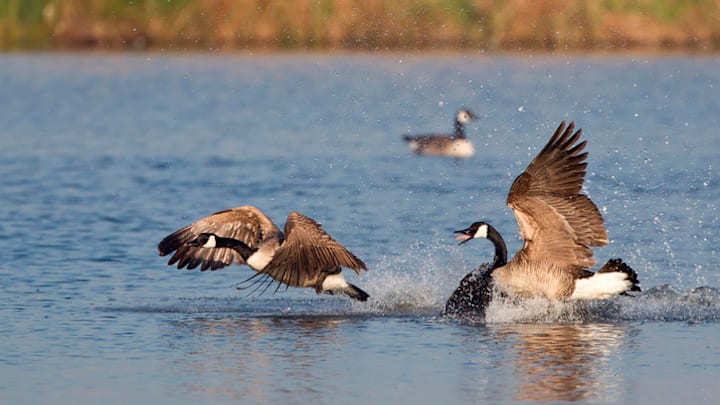It’s easy to presume that when you describe something as being like a wild goose chase, what you really mean is that it’s as futile or as difficult as chasing after and catching a wild goose. But, strictly speaking, that’s not the case. The original wild goose chase didn’t have anything to do with chasing wild geese. Rather, it involved chasing after someone (or, as the case may be, being chased yourself) like a wild goose.
What has long been credited as the earliest written record of a wild goose chase (more on that in a minute) came from William Shakespeare’s Romeo and Juliet, written sometime in the early-to-mid 1590s. Mercutio says to Romeo:
“Nay, if our wits run the wild-goose chase, I am done, for thou hast more of the wild-goose in one of thy wits than, I am sure, I have in my whole five. Was I with you there for the goose?”
Mercutio is complaining about losing a battle of wits (part of a conversation that includes one of Shakespeare’s dirtiest jokes) to Romeo while they wander the streets of Verona waiting to meet with Juliet’s nurse. And here, he’s seemingly comparing their “hunt” for the perfect one-liner in their jibing, back-and-forth conversation to what appears to be an actual goose hunt.
Because this was thought to be the phrase’s earliest written record, the origin of wild goose chase has long been credited to Shakespeare and merely chalked up to just another of his many literary inventions. But it’s more likely that Shakespeare was playing on an already established term that has its roots in hunting with horses, not hunting birds.
Take a look at these lines from a poem, “The Mother’s Blessing,” by the English writer Nicholas Breton, written in 1602:
“Esteeme a horse, according to his pace
But loose no wagers on a wilde goose chase”
Although Breton wrote this poem as much as a decade after Shakespeare had completed Romeo and Juliet, it’s thought Breton’s work alludes to the phrase’s original meaning. Originally, a wild goose chase was a horse race in which a leading rider would head off into a field and make an especially challenging, winding course through the surrounding land. A second rider would then have to follow, retracing the first rider's steps exactly and copying his every twist and turn, no matter how difficult, as they chased after him. A third rider would then set out after the second, and then a fourth and so on, until an entire group of riders was tracking one another through the countryside, all retracing the leader’s steps.
This method of horse racing—which may have been used as a means of challenging younger or less experienced riders’ horsemanship—became known as a wild goose chase because each rider in the group precisely follows the one in front, just as a flying geese neatly follow one another in a V shape in the sky. It’s thought that this was the first wild goose chase, before confusion over the wording of the phrase—was it a wild-goose chase or a wild goose-chase?—led to the emergence of the second meaning, as used by Shakespeare.
Both meanings coexisted for another century or so (the Oxford English Dictionary has unearthed a reference to a horse-riding wild goose chase dating from as late as the 1690s), before the older of the two began to fall out of use, and Shakespeare’s goose-chasing meaning took its place. Over time, the older meaning was eventually forgotten altogether; even Samuel Johnson failed to acknowledge it at all in his Dictionary of the English Language in 1755, simply defining wildgoosechase as “a pursuit of something as unlikely to be caught as the wildgoose.” And the term's surprising horse racing origins have remained consigned to the history books ever since.
Have you got a Big Question you'd like us to answer? If so, let us know by emailing us at bigquestions@mentalfloss.com.
Discover More Phrase Origins:
A version of this story was published in 2016; it has been updated for 2024.
